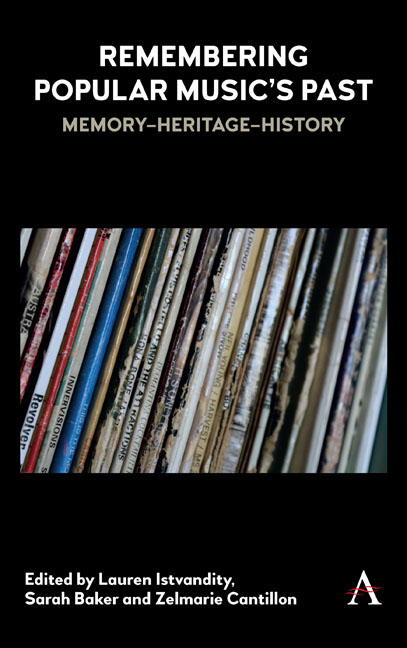Chapter 1 - The Precarity of Memory, Heritage and History in Remembering Popular Music's Past
Published online by Cambridge University Press: 09 July 2019
Summary
Introduction
The growing interest, globally, in the preservation of popular music's material past is beginning to yield a substantial range of scholarly explorations into how popular music, as heritage, is produced and legitimized (Brandellero et al. 2014) in ways that confer ‘critical acclaim, historical importance and cultural value’ (Bennett 2009, 478). The chapters in this collection all have as their starting point Les Roberts's (2014, 276–77) assertion that we must ‘break[] down music heritage discourses into the spaces, practices and “acts of transfer” that play performative host to the cultures of popular music pasts’ in order to ‘gain a better understanding of how these pasts […] are lived in the present’. Hence, the focus here is on the transformation of popular music into heritage, and the role of history and memory in this process. The collection is particularly interested in the ways in which popular music's past becomes enacted in the present, and explores the condition of this heritage. Despite the overwhelming permeation of popular music into everyday life, the ephemeral nature of both tangible and intangible aspects of popular music's past foreshadows the reality that the items for preservation –and preservation practices themselves –are in danger of partial or complete loss. What were once considered the disposable by-products of popular music and culture –ticket stubs, posters, photographs, limited issue records, personal stories –have now become the target of enthusiast and expert efforts to preserve the artefacts, music and oral histories of our recent past. Such items are often located in ambiguous places –hidden under the bed, boxed in the garage, forgotten in the attic. Some of these objects eventually make their way into the collections of museums, archives and halls of fame, but many, once discovered lurking in those out-of-sight, out-of-mind places, become designated as ‘rubbish’ and end up as landfill (Baker and Huber 2015).
In this collection, we emphasize the interrelated nature of memory, heritage and history, which work alongside one another, particularly in the context of the recent past, where heritage and history of popular music is both lived and remembered by communities, subcultures and societies.
- Type
- Chapter
- Information
- Remembering Popular Music's PastMemory-Heritage-History, pp. 1 - 8Publisher: Anthem PressPrint publication year: 2019



